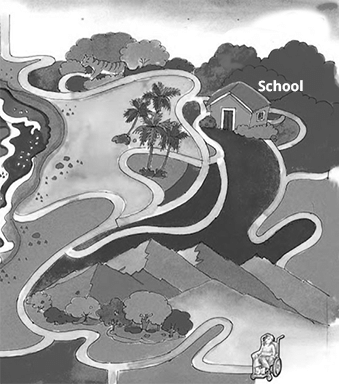Chuskit Goes To School Questions and Answers - Free PDF Download
FAQs on NCERT Solutions For Class 4 Evs Chapter 27 Chuskit Goes To School - 2025-26
1. What were the Issues Faced by Chuskit?
Ans: Chuskit was a school student and was physically impaired. His classroom was on the first floor of the school. He used to go everywhere using a wheelchair without any problem but it was difficult for him to use the stairs. The first floor had a ramp instead of stairs which was a good thing, but it was difficult for him to climb the ramp. His classmates used to help him climb the ramp of the school and he would find it easier to go to the classroom with their help.
2. Describe the Lifestyle of Chuskit?
Ans: Chuskit was a school going boy. He was impaired physically and he couldn't walk due to this condition. So, he took the help of a wheelchair and went to school. This helped him to some extent but he was facing issues while he would go to his classroom, which was on the first floor of the school. There was a ramp to go to the first floor. The issue that she faced was to climb the ramp. His classmates used to help Chuskit.
3. What is Chapter 27 EVS of Class 4 about?
Ans: Class 4 EVS Chapter 27 Chuskit Goes to School is a story of a physically challenged youngster who uses a wheelchair to get to school. To go to the class, the school will have a ramp for physically challenged youngsters. In this chapter, the topic specialists explain this idea in such a way that it sticks in the brains of the students and they like the chapter. When creating this topic, the subject specialists paid close attention to this aspect. All of the questions and points are given in detail and in a logical order that will aid students in their exam preparation.
4. What are common topics in Chapter 27 of Class 4 EVS to come in the exam?
Ans: In NCERT Solutions for Class 4 EVS Chapter 27, all the topics are equally essential. All of the answers to all the questions from Chapter 27 of Class 4 EVS. The Class 4 EVS exam will mostly consist of short-answer questions worth one mark. The questions will primarily revolve on real-life scenarios and how students would respond to them. Students' cognitive capacity will be improved, and they will be better prepared to act quickly in similar situations in the future.
5. Why is school important?
Ans: School is a place that provides children with knowledge and education. It is very important as it develops a base for the future character of a student. The school does not discriminate between any child. It provides education to all children equally. This aids in the development of their thinking process. School is significant because it serves as a tool for preparing us for life. We may learn not just the fundamental abilities of reading, writing, and arithmetic, but also about individuals, locations, and environment.
6. How are NCERT Solutions beneficial for Chapter 27 EVS Class 4?
Ans: The NCERT Solutions PDF file for this chapter can be downloaded free of cost from Vedantu’s website or app. Once you have downloaded the PDF file, you'll have access to it at any time. This topic will cover key aspects and the concepts will be simple to grasp. Grabbing the concepts won't take long because the principles will be applied to real-life scenarios. Students would be engrossed in the notion since the issue is so intriguing to them. This type of information will not only guarantee that the topic is understood, but it will also help you do well on the exam.
7. Who is a physically disabled student?
Ans: Many children with physical disabilities have poor coordination, weak muscles, tight muscles, or no muscle strength at all. All physically disabled children have physical restrictions to some extent. To put it another way, handicapping conditions might be temporary or permanent, minor or severe. Children who are physically challenged may also be mentally challenged, visually impaired, or hearing impaired. Physical impairments might vary in terms of duration and severity. In terms of education, however, not all students with physical impairments require special school accommodations.


























